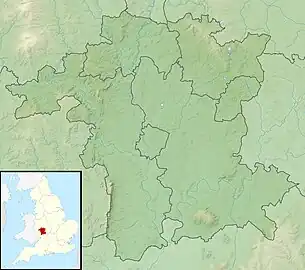| Dowles Brook | |
|---|---|
 Dowles Brook within the Wyre Forest | |
 Location within Worcestershire | |
| Location | |
| Country | England |
| Counties | Shropshire, Worcestershire |
| Physical characteristics | |
| Source | |
| • location | Bagginswood, Shropshire |
| Mouth | |
• location | River Severn, Worcestershire |
• coordinates | 52°23′06″N 2°19′29″W / 52.38500°N 2.32472°W |
| Length | 15.5 km (9.6 mi)[1] |
| Basin size | 46.2 km2 (17.8 sq mi)[1] |
Dowles Brook flows through the heart of the Wyre Forest, into the former civil parish of Dowles and into the River Severn.
History
In 1902, ornithologist and naturalist Jannion Steele Elliott purchased the Elizabethan era building Dowles Manor, near the confluence of Dowles Brook into the Severn.[2] By the time of his death, in 1942, he had bought up the surrounding land, piecemeal, until he owned the portion of the valley, formed by the Dowles Brook, surrounding Dowles Manor; he maintained this land as a nature reserve.[2]
Conservation
During the summer of 2012, with funding from the Environment Agency, the Worcestershire Wildlife Trust attempted an ambitious project to eradicate the invasive Himalayan Balsam from a 3 km watercourse, hoping to improve biodiversity and reduce soil erosion. A pilot project was carried out on the Lem Brook, a tributary of the Dowles Brook.This was a success but as the seeds persist in the soil for up to two years repeat eradication was planned for 2014 followed by close monitoring.[3]
References
- 1 2 "WFD Surface Water Classification Status and Objectives 2012 csv files". Environment Agency. Archived from the original on 24 February 2014. Retrieved 20 June 2014.
- 1 2 Forrest, H.E. (1 July 1942). "Obituary. Jannion Steele Elliott (1871-1942)" (PDF). British Birds. Vol. 36, no. 2. p. 35. Retrieved 28 November 2020.
- ↑ Peter Case April 2013 Open Space Invaders, p53 Worcestershire Life Cheltenham, Gloucestershire.